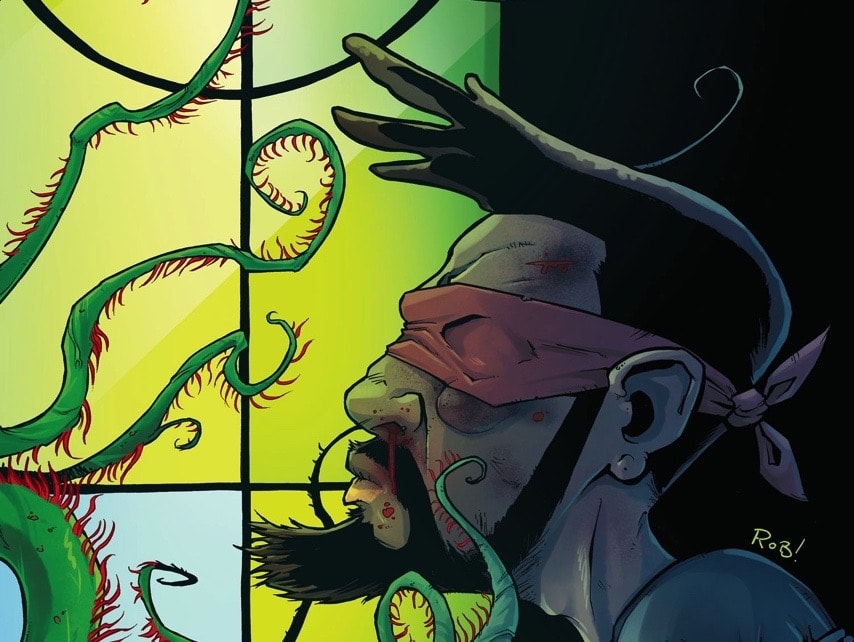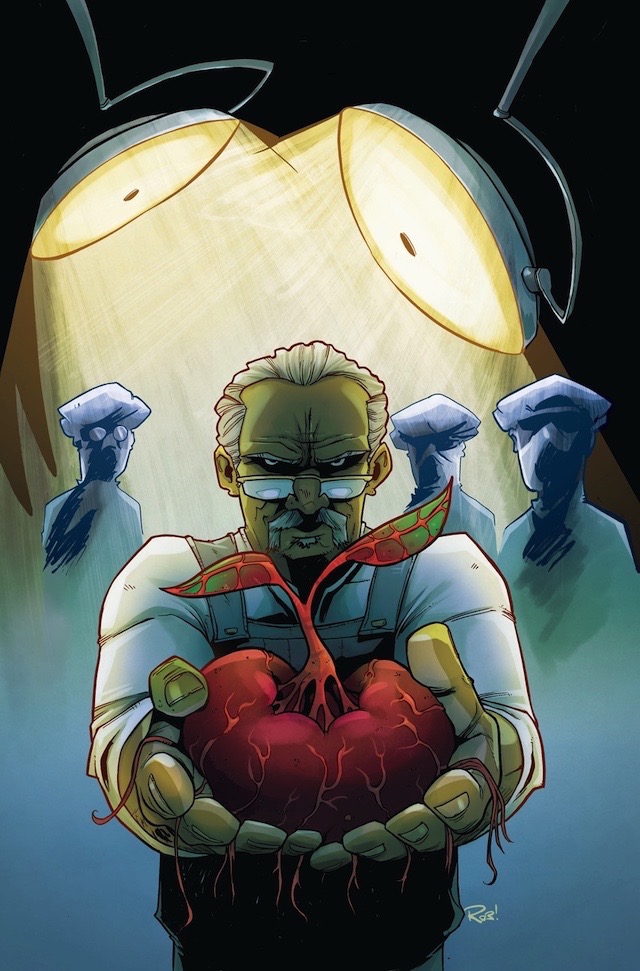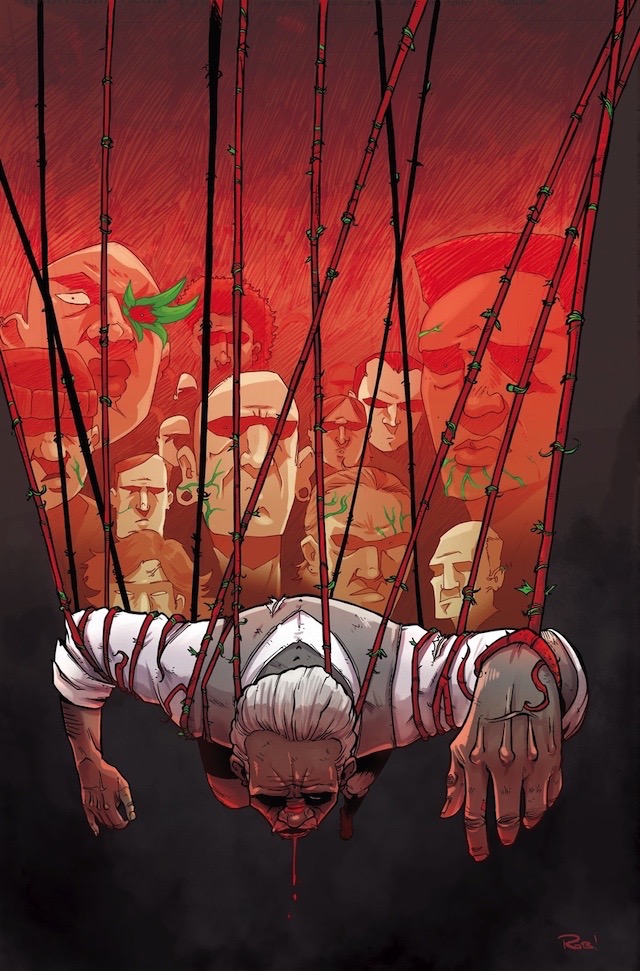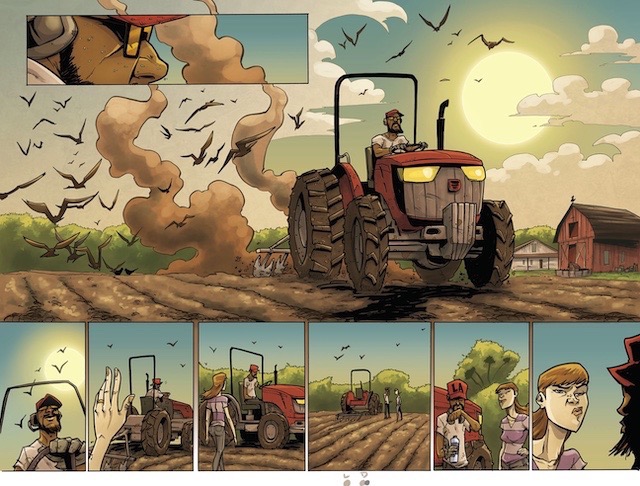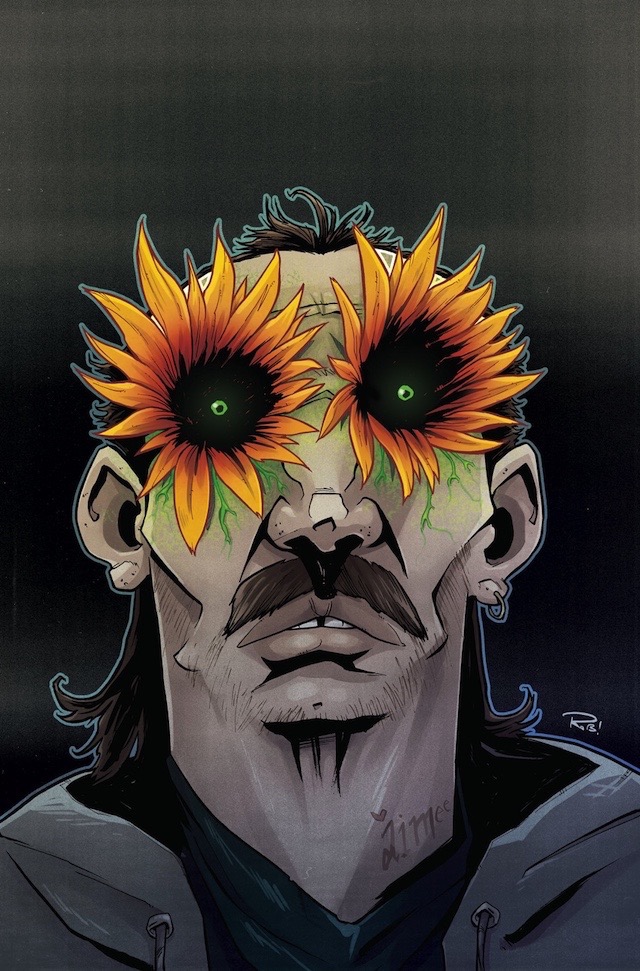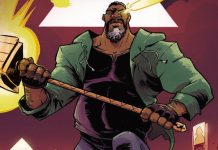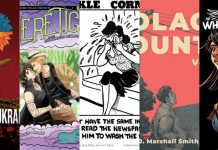Once CHEW completed its 60+ issue long it didn’t take long for the ever-prolific Rob Guillory to launch his new series FARMHAND, which he both writes and draws. The series started out strong and the first arc ended with a bang. Having read a little of what comes next I can say it only gets wilder and more compelling with the start of its new volume. I was happy when Rob reached out to discuss the book. He shared where the story is going, his growth as a storyteller, and the personal events that shaped FARMHAND. You can find all that and more below.
What made you want to make a comic about fathers and sons?
As most people know, before FARMHAND I spent the previous eight years working on CHEW. What a lot of people don’t know is I’d gone through this period of rapid-fire change during that time. I’d become a father three times over, all while having to face some hard truths about my own father. Plus the man who was my father figure growing up, my uncle who introduced me to comics, had been killed in a mugging a mere two months before my first son was born.
So all of this was swirling inside me while I was drawing this goofy comic about cannibal cops and cyborg chickens. And as I finished CHEW, it occurred to me that I hadn’t really dealt with a lot of the trauma of these events. I’d just stuffed them while I paid the bills drawing CHEW. CHEW wasn’t the appropriate venue for me to work through these issues, so I needed a place to express these things I’d been ruminating on for years. That’s FARMHAND.
How does Zeke’s relationship with his son compare to his relationship with Zebediah?
Zeke’s relationship with his son Riley hasn’t been soiled yet. There’s this small window of time in a kid’s life where they look at their parents as if they’re God, ya know? They haven’t been disappointed by their parents’ shortcomings yet. That’s Riley. He’s at that age where he’s just starting to see Zeke’s weaknesses, but it hasn’t really caused him to grow jaded toward Zeke. Zeke’s relationship with Jedidiah is on the other side of that. Zeke’s been disappointed by Jed for years at this point, to the point where he can’t fathom his father doing the right thing. And as the second arc begins, we see Zeke’s not totally wrong.
How do you strike a balance between the horror and comedy in FARMHAND?
Looking back, I can see that really was the hardest part of making the first arc. Especially coming off of a book like CHEW, which was often straight slapstick. In the beginning, as I found my way through the first issues, there were some remnants of that same humor that found its way into FARMHAND. I think a lot of it worked, but some of it didn’t. Going into the second arc, the story has progressed to a point where things have gotten darker, a villain has emerged, and there’s less room for things like fart jokes (as much as I love them). There are certainly some funny moments that emerge in the midst of the darker tone, but a lot of FARMHAND’s humor comes from how truly human the characters are. They’re very flawed, broken people, and oftentimes the most fundamentally flawed people tend to be the funniest. It’s not a matter of forcing humor into a situation. The comedy sort of comes out of the characters because humor is a way humans cope with the horror around them.
You shake up the status quo in a big way at the end of Issue 5. Do you want the arcs to each feel very distinct from each other?
Yes. I sort of set up the beginning of FARMHAND’s first arc as an entrance point for readers who only knew me from CHEW. So there’s a lot of comedy in the first few issues. Right around issue 4, I began to turn things into more intimate, darker territory, which was always the plan. By the end of issue 5, things have gotten VERY dark, and that’s where we are in the second arc. I always looked at the second arc as “the arc where bad things happen”, and that’s true. I always planned FARMHAND as a finite story, maybe 30 issues, so it’s not a book where readers can just expect the status quo to remain the same for long periods. The story, like the characters in it, are undergoing rapid change. It keeps the readers on their toes and keeps me having fun.
Is the shift to the status quo between volumes also in part because of the hiatus between volumes?
In part, yes. FARMHAND’s a pretty small operation, and I can only handle so much as the guy writing, drawing and managing the project. If we’re going to take production hiatuses, we need to make readers feel like they CANNOT miss the next arc. There needs to be a sense of urgency, and I think reinventing the book each arc adds that.
In a scene from Issue 5 Jed attempts to grow a new brain but is terrified by the result. Is there more to what scared him than what meets the (forgive the pun) eye?
Absolutely, and we’ll find out more about that down the road. It’s clear that certain characters have warned Jed against making the Seed, so it’s safe to assume Jed really hopes the doubters were wrong. He doesn’t want to believe he’s made a monster.
Is the true nature of the Seed something that will be slowly answered throughout the series or something that will be answered relatively quickly?
I plant a lot of seeds (sorry) in the first two arcs that point to a pretty clear origin, but things become even clearer in later arcs. I’m planning to explore the origin of the seed in detail around arc 3 or 4. I think the mystery needs to be there for a while, but there is clear resolution coming.
Did you research herbology while developing Farmhand?
A bit. FARMHAND’s not at all hard science fiction, so I don’t get too technical. But I wanted enough to keep things rich, so I researched the use of certain plants as medicine, as well as tons of photo research for inspiration when drawing the book.
Did the research influence story beats?
Some. Mostly my plant research served as inspiration for Seed’s effects on human behavior. I think seasonal shifts probably have a bigger effect on how I pace out the story. The story begins in the early Spring, when things are just sprouting. By the second arc, we’ve moved to the summer, when things are in harvest. The next arc will likely be the fall.
You’ve been open about the series containing Biblical undertones. Are there any stories in particular you’re pulling from or is the Biblical influence a little more subdued?
I don’t think it’s anything as on-the-nose as pulling from particular stories from the Bible. That’s not really my thing. The Bible was written in an agricultural society, and it points to the fact that there are certain truths about farming that are also true of humanity. What you sow, you will reap, whether you’re a farmer or a parent raising young kids.
Once I started forming this story, I started realizing how many times the Bible talks about the human condition through the metaphor of plants. There were so many verses about how one small seed can either blossom into something of great good or great evil. Whether you’re a Christian or not (which I am), I think it’s undeniable that this way of thinking is very present in our culture. It was (pardon the pun) rich soil for this story.
You said you began writing FARMHAND with full scripts. As you’ve progressed have your scripts become looser?
Here and there, maybe. I still write full scripts, just because I enjoy writing them, and I enjoy reading them. I also want to keep flexing that muscle for potential future projects.
Are you interested in writing for other artists at some point?
Yeah, I think it’s just a matter of time. As an artist, I’m selfish, and I want to draw all my stories myself, but that’s not realistic. I’ve started forming a couple other projects already, so it’s just a matter of finding the right artist to partner with. It’s gonna be tough because I’m pretty regimented with my work schedule, so it’s gonna be hard to find a partner who shares that passion.
How have you grown as a storyteller now that you’ve spent the past year or so writing and drawing your own series?
I feel a bit more weathered, I think. Maybe a bit more confident. FARMHAND has been the hardest thing I’ve ever done, while being my most fulfilling project thus far. It’s stretched me in a lot of ways that were very uncomfortable at first, but now I see all the pain is shaping me into a better storyteller. I feel more at ease in my skin and ready to see the rest of this project blossom.
Follow Rob on Twitter @Rob_guillory and through his website robguillory.com. While you’re at the site check out the FARMHAND swag and original art. Also, the series has an original soundtrack! Get more info about that at SkySpeaks.com.
Matt Chats is an interview series featuring discussions with a creator or player in comics, diving deep into industry, process, and creative topics. Find its author, Matt O’Keefe, on Twitter andTumblr. Email him with questions, comments, complaints, or whatever else is on your mind at [email protected].


